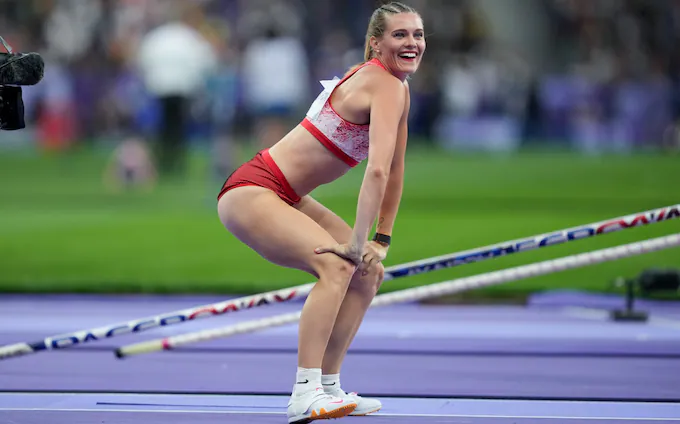Canadian pole vaulter Alysha Newman has called for significant changes at the Olympic Games following her viral celebration of winning a bronze medal in the women’s pole vault. The 30-year-old athlete, who set a national record by clearing 4.85 meters, has been a hot topic of discussion not only for her performance but also for her exuberant twerking celebration, which has captivated and divided social media.
Historic Achievement in Paris
Alysha Newman made history on August 7, 2024, by becoming the first Canadian woman to secure a medal in the women’s pole vault at the Olympics. Her impressive vault, which broke her own national record, earned her a bronze medal at the Stade de France. Australian pole vaulter Nina Kennedy clinched gold with a height of 4.90 meters, while American athlete Katie Moon took silver.
The competition was set against the backdrop of Armand Duplantis’ record-breaking performance in the men’s pole vault final, where the Swedish pole vaulter set a new world record. For Newman, the achievement was a triumphant return to the Olympic stage after a five-year absence from major finals.
Viral Celebration and Controversy
Newman’s victory was followed by a celebration that has stirred significant controversy. After clearing 4.85 meters on her second attempt, Newman performed a twerking dance, which she later described with humor as a moment she might even get framed. The celebration, captured on video, quickly went viral, leading to mixed reactions online. While many applauded Newman’s joyful expression of success, others criticized her for what they perceived as an attention-seeking stunt.
Amidst the social media frenzy, Newman’s celebration sparked a broader conversation about the role of athletes in the digital age and the intersection of sports and entertainment. The pole vaulter, who also models on OnlyFans, has seen an increase in her online visibility and potential earnings due to her Olympic success.
Calls for Change in Olympic Protocols
In addition to discussing her viral celebration, Newman used her platform to advocate for changes to Olympic protocols. She expressed frustration at the treatment of her coach during the pole vault final. According to Newman, her coach nearly faced eviction from his seat due to the crowded and restrictive seating arrangements for coaches and team staff.
“I was very close to sharing some words over there and really letting them know that of course we understand that there’s more than 12 girls in the final, but it’s important and it’s an event that needs coaches present,” Newman explained at a press conference following her victory.
Newman proposed the introduction of a designated ‘coaching section’ for track and field events at future Olympics. She suggested that such a section could be located between the stands and the photographers, allowing coaches to be closer to their athletes without obstructing views. Newman believes this change would enhance communication between athletes and their coaches and improve the overall experience for both participants and spectators.
The Intersection of Sports and Social Media
Newman’s call for change highlights a growing trend of athletes using their platform to address issues within their sport. The rise of social media has amplified both the successes and controversies of athletes, as seen with Newman’s viral celebration. Athletes are increasingly leveraging these platforms to share their achievements, advocate for change, and engage with their fans in new and innovative ways.
The debate surrounding Newman’s celebration and her subsequent advocacy for Olympic reform reflects broader discussions about the evolving nature of sports and the role of digital media in shaping public perception. As athletes like Newman continue to push boundaries and challenge traditional norms, the landscape of professional sports is likely to undergo further transformation.
Conclusion
Alysha Newman’s bronze medal and celebratory dance have sparked a significant conversation about Olympic protocols and the role of social media in sports. Her advocacy for a designated coaching section at future Olympic events underscores a desire for improved support and communication within the competitive arena. As Newman’s story continues to unfold, it serves as a reminder of the dynamic interplay between athletic achievement, personal expression, and the evolving nature of the global sports stage.

